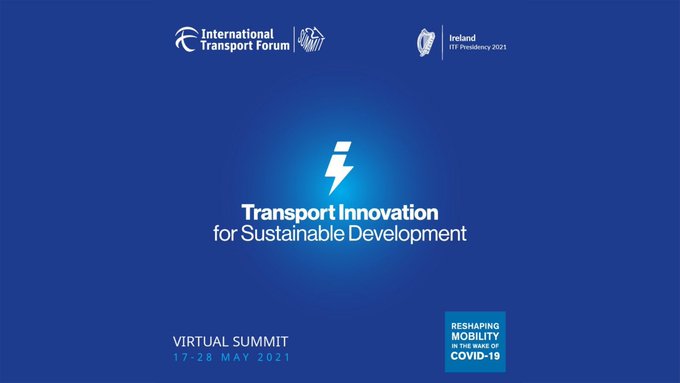Sustainable Mobility only possible with rail at its backbone, says UNIFE at 2021 International Transport Forum
Following the European Commission’s 2020 EU Green Deal commitments to making Europe the first carbon neutral continent and doubling of all rail traffic by 2050, UNIFE held a digital side session as part of the OECD’s 2021 International Transport Forum (ITF) titled Innovative Rail for Sustainable Mobility on 28 May to discuss the necessity for innovative rail to achieve these ambitions. Thanks to ITF’s inclusion of our association in this year’s impressive conference, we were able to convene high level representatives from the European institutions, industry and academia to jointly explore how the most sustainable mode of transportation can be properly iterated upon to form the backbone of a green mobility system that reflects the gravity of the climate crisis.
At the present, transport as a sector emits more greenhouse gases (GHG) emissions than all others – with the exception of energy production. For this reason, decarbonising transport is a requirement to eliminating Europe’s harmful impact on environment. Fortunately, the European Union has a proven, safe and reliable form of transport well-suited to serve as the foundation of a future multimodal, green mobility system. Rail is the only form of transportation that has managed to not only reduce its environmental impact since the 1990s, but also increase its capacity. With sufficient investments and support for rail projects and Research and Innovation endeavours, Europeans can put themselves on track for a green future by investing in the technologies – ranging from improved rolling stock to digital assets – that will allow it to provide accessible and interoperable service across the EU and their deployment.
Occurring during the European Year of Rail, a Commission-initiated, year-long series of events recognising our sector’s historic achievements and potential contributions, the session’s participants had the opportunity to engage on topics ranging from the innovations delivered by the Shift2Rail Joint Undertaking to the ambitions of its successor programme, Europe’s Rail Joint Undertaking, to embrace new opportunities presented in the post-COVID-19 era. Seizing the moment and utilising demonstrably successful institutionalised research partnerships will be critical to transforming this unprecedented year into the launching point need to achieve the EU’s bold sustainability ambitions. It will also support the competitiveness of the EU rail supply industry at worldwide level.
Convening a panel composed of representatives from European Commission, Shift2Rail Joint Undertaking, Alstom and Eindhoven University of Technology, participants explored the best means of advancing innovations in rail as a means of contributing to a green transition. The panel, moderated by UNIFE Director General Philippe Citroën came to the consensus that rail is well-equipped to play a leading role in a sustainable mobility system and that investing in the development and deployment of next generation components is key to a carbon neutral future.
Rosalinde van der Vlies, Director for Clean Planet at the European Commission’s Directorate-General for Research and Innovation, stated: “With the European Green Deal, the EU aims to become the first climate-neutral continent by 2050. Research and Innovation are crucial to achieve this ambitious objective. Through Horizon Europe, the EU will invest in sustainable mobility R&I solutions. Railways will play a major role in these. The Smart Sustainable Mobility Strategy aims to double high-speed rail traffic across Europe by 2030 and double rail freight traffic by 2050. To achieve these objectives for rail traffic, we need close collaboration with the organisations that will bring about significant changes. The new Horizon Europe partnership on Europe’s Rail will be entirely focused on effectively modernising the railways in Europe to bring about the necessary capacity increases and accelerate the green and digital transitions for Europe.”
Professor Ines Lopez Arteaga, Dean Bachelor College at Eindhoven University of Technology, explained: “Research and Innovation improves quality of life of passengers and citizens through TRANSIT project aimed at boosting interior acoustic comfort and reducing environmental impact of railways”
Carlo Borghini, Executive Director at Shift2Rail Joint Undertaking, elaborated: “Shift2Rail Research and Innovation set the basis for a major transformation of the rail system to be accelerated by Europe’s Rail; during the decade, it will deliver to the European citizens sustainable mobility and transport with rail as its backbone”
Richard French, Shift2Rail Programme Management and Cross-Cutting Activities Coordinator at Alstom, said: “Rail is a very energy efficient mode of transport but with further development and the implementation of emerging technologies it can make an increasingly significant contribution to the current challenges. Shift2Rail and its successor Europe’s Rail provide the opportunity to bring together all stakeholders and in a co-ordinated way, focus activities on areas which have the most impact.”
Philippe Citroën, Director-General of UNIFE, reminded attendees in his closing remarks that: “Climate change is an unprecedented crisis with global implications. To ensure the wellbeing of the environment, it is essential that the EU continues and increases its rail research and innovation initiatives. By enabling the development of rail solutions through Shift2Rail and its successor programme – Europe’s Rail – we can position rail at the backbone of a sustainable mobility system capable of meaningfully contributing to EU Green Deal decarbonisation objectives.”
|
